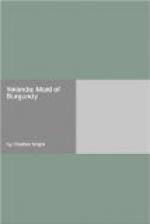“I do,” the girl answered, with a queer, half-sad, half-amused expression upon her face which Max could not interpret.
“But we cannot break the chains that have been welded a thousand years—that have grown stronger and tighter with each generation,” said Max. “You truthfully said, ‘One may only endure.’”
“I also said that at rare moments one may hope,” she answered, with drooping head.
“Not I, Fraeulein. I may not even hope. I am doomed,” answered Max.
“No, no, Sir Max,” responded the drooping head.
After a prolonged silence Max said, “I am sure the secret of my station is safe with you.”
“You need not doubt, Sir Max,” she responded. “You cannot know how safe it is.” She turned brightly upon him and continued, “Let me invoke my spirits, Sir Max.” She raised her eyes, saint-fashion, toward heaven, and spoke under her breath: “I hear the word ‘hope,’ Sir Max, ‘hope.’ It is very faint, but better faint than not at all.”
“I tell you there is no hope for me, Fraeulein,” responded Max, desperately. “It is cruel in you to say there is. It is doubly cruel to speak jestingly.”
“I speak earnestly,” said Yolanda. “There is hope. If you win the lady who gave you the ring, you will be happy. I do not jest.”
“You do. You mock me,” cried Max. “I tell you, Yolanda, there is in all the world no woman for me save—save one upon whom I may not think.” Yolanda’s face grew radiant, though tears moistened her eyes. “Even though it were possible for me to defy my parents, to turn my face against my country, my people, and the sacred traditions of my house, by asking her to share my life, there could be only wretchedness ahead for her, and therefore unhappiness for me. The dove and the eagle may not mate. Consider the fate of sweet Agnes Bernauer, who married Duke Albert and perished in the Danube. I tell you, Fraeulein, I am hopeless. When I return to my people, I shall do so knowing that life thereafter will be something to endure, not a blessing to thank God for.”
“No, no, Sir Max,” murmured the girl, “you do not know.”
Max turned upon her almost angrily:—
“A man knows when he lives; a man knows when he is dying, and a man, if he be worthy of the name, knows when he loves a woman. I am not sure that the sun shines, Fraeulein, than I am that I shall not forget this woman nor cease to sorrow for her all the days of my life.”




